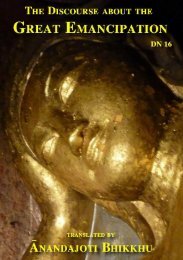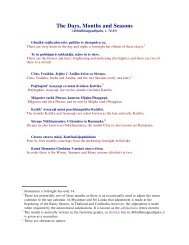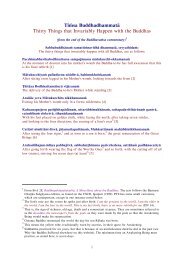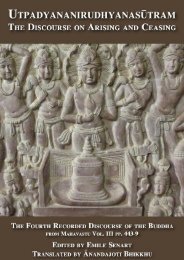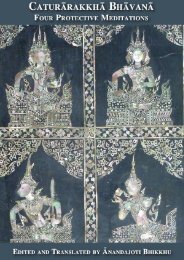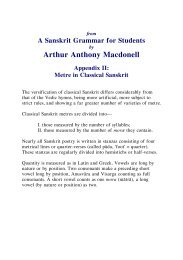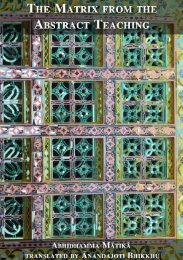BhikkhunÄ«saá¹yutta Thematic Discourses about Nuns - Ancient ...
BhikkhunÄ«saá¹yutta Thematic Discourses about Nuns - Ancient ...
BhikkhunÄ«saá¹yutta Thematic Discourses about Nuns - Ancient ...
Create successful ePaper yourself
Turn your PDF publications into a flip-book with our unique Google optimized e-Paper software.
The <strong>Thematic</strong> <strong>Discourses</strong> <strong>about</strong> <strong>Nuns</strong> - 15<br />
Aṭṭīyāmi harāyāmi, kāmataṇhā samūhatā.<br />
I am distressed 26 and ashamed, 27 and have rooted up sensual craving.<br />
Ye ca rūpūpagā sattā, ye ca arūpaṭhāyino,<br />
There are beings who reached form, and those in the formless state,<br />
Yā ca santā samāpatti sabbattha vihato tamo.” ti<br />
(But) those who have attained to peace 28 have destroyed darkness everywhere.” 29<br />
Atha kho Māro Pāpimā: “Jānāti maṁ Vijayā bhikkhunī!” ti<br />
Then the Wicked Māra (thought): “The nun Vijayā knows me!”<br />
dukkhī dummano tatthevantaradhāyī ti.<br />
and pained and depressed he vanished right there.<br />
166. Evaṁ me sutaṁ:<br />
Thus I have heard:<br />
SN 5.5 Uppalavaṇṇāsuttaṁ<br />
The Discourse <strong>about</strong> Uppalavaṇṇā<br />
ekaṁ samayaṁ Bhagavā Sāvatthiyaṁ viharati<br />
at one time the Gracious One was dwelling near Sāvatthī<br />
Jetavane Anāthapiṇḍikassa ārāme.<br />
at Anāthapiṇḍika’s grounds in Jeta’s Wood.<br />
Atha kho Uppalavaṇṇā bhikkhunī, pubbaṇhasamayaṁ nivāsetvā,<br />
Then the nun Uppalavaṇṇā, having dressed in the morning time,<br />
pattacīvaram-ādāya, Sāvatthiṁ piṇḍāya pāvisi.<br />
after picking up her bowl and robe, was entering Sāvatthī for alms.<br />
26 Comm: aṭṭīyāmī ti aṭṭā pīḷitā homi; I am distressed means I am grieved and harassed.<br />
27 Comm: harāyāmī ti lajjāmi; I am ashamed means I am abashed.<br />
28 Comm: santā samāpattī ti aṭṭhavidhā lokiyasamāpatti ārammaṇasantatāya aṅgasantatāya ca<br />
santā ti vuttā; attained to peace means it is said that in eight ways the mundane attainments<br />
bring peacefulness to the limbs and to sense-objects. This is interpreting the last line as<br />
referring to only mundane attainments, which doesn't make good sense to me; there is<br />
evidently a contrast intended in the verse between those still attached to sense pleasures,<br />
form and the formless, with those (referred to in the last line) who have gone beyond.<br />
29 Comm: sabbatthā ti sabbesu rūpārūpabhavesu, tesaṁ dvinnaṁ bhavānaṁ gahitattā gahite<br />
kāmabhave aṭṭhasu ca samāpattīsū ti. Etesu sabbesu ṭhānesu mayhaṁ avijjātamo vihato ti<br />
vadati; everywhere means in all the form and formless worlds, the grasping nature of these<br />
two worlds and the eight attainments grasped-at in the sensual world. For me the darkness of<br />
ignorance is destroyed in these places, is what is said.



